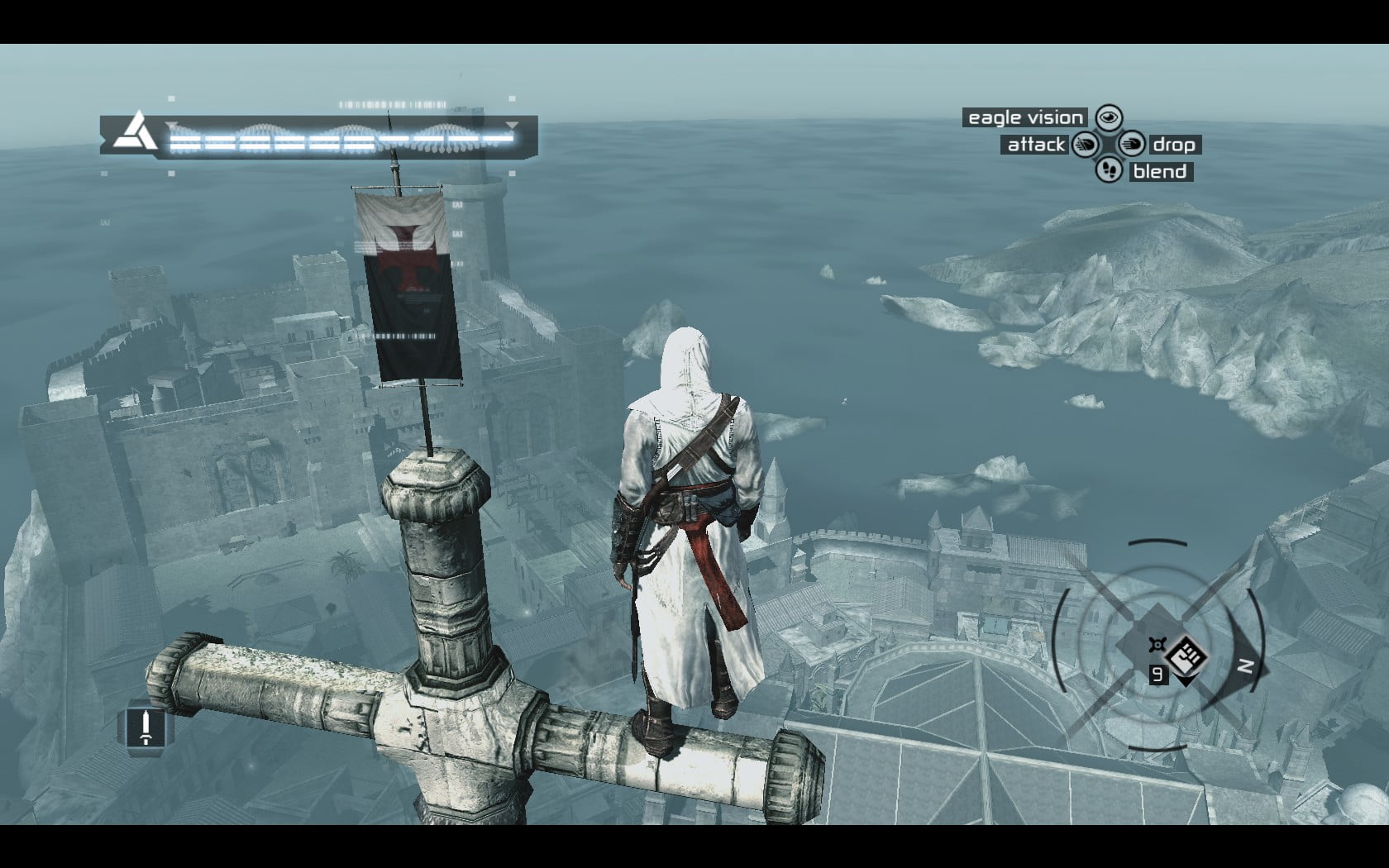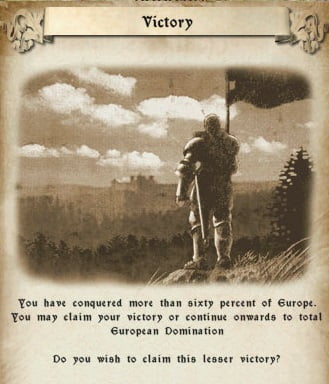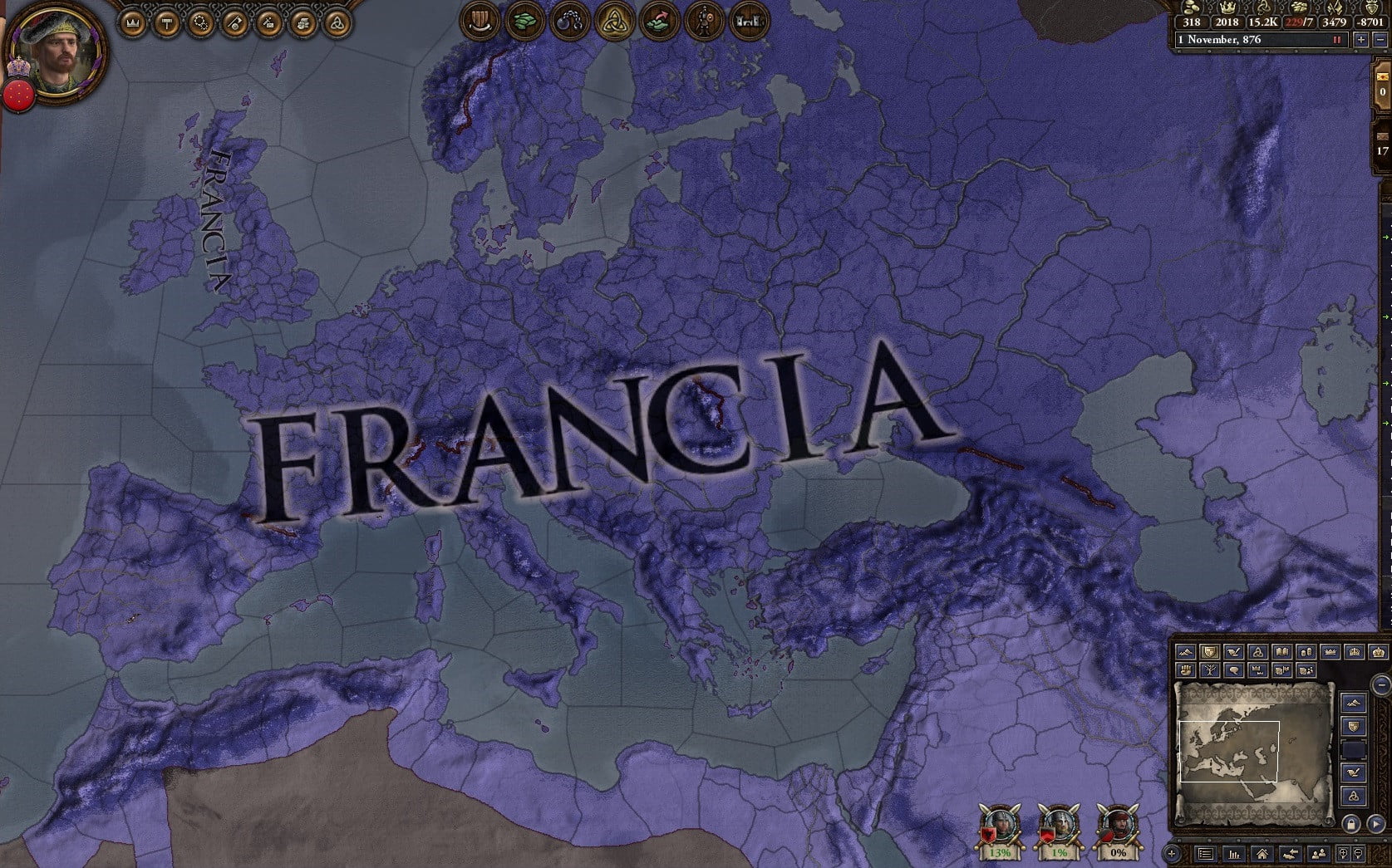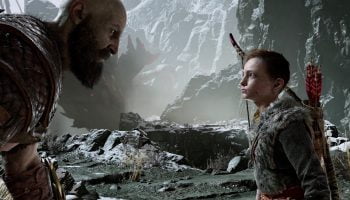The Public Medievalist and Extra Credits have previously highlighted the distinction between factual accuracy (dates, names, places etc.) and mechanical accuracy (how the world actually works, how NPCs behave, what the rules are) in historical computer games. They both rightly underlined how mechanical accuracy is generally more important than factual accuracy in this interactive medium. However, neither of these pieces really talk about game objectives, and this is where they drop the ball. Objectives (how the game is won or lost, what the player is told to do in game, and what the player is required to do to earn optional Achievements) can be the most important element of a game.
Objectives don’t quite fit into either factual or mechanical accuracy. The objectives of a game are closely tied to its mechanics, but are, nevertheless, distinct. While mechanics allow a game to be interactive, objectives form a different element of play. They tell the player what they should be trying to achieve. They encourage or outright coerce the player into a certain pattern of behaviour. Even sandbox games with no formal objectives are affected by this – players come into these games with certain expectations of their purpose drawn from the game’s genre and the community around it: in Minecraft, you build and survive; in Crusader Kings II, you expand your kingdom.
This allows objectives to bridge the gap between narrative and gameplay, steering the use of the mechanics towards historically accurate or authentic outcomes (or not). As a result, objectives can exert a much more overt and extreme influence than game mechanics on how we play a game and, as a consequence, how we think about history.
I propose that objectives in historical computer games can be divided into four rough categories: Victory Objectives; Progression Objectives; Beneficial Objectives; and Challenge Objectives. I’m going to define these categories and then talk about how they influence how we play and how this in turn can alter our perceptions of history.
How to Win Games and Influence People
Victory Objectives are the most basic and fundamental goals of the game. They’re what the player is ultimately trying to achieve—what they need to do to win. The king-sim Medieval: Total War (and its sequel Medieval: Total War II) casts the player in the role of a ruler of a medieval kingdom and charges them with the conquest of the known world (or a sizeable chunk of it at any rate). The original Assassin’s Creed is a third-person stealth-based fighting game which tasks the player, cast in the role of a disgraced member of the Assassins, with regaining his position within the organisation by murdering a series of targets.
However, not all Victory Objectives are mandatory. In some games there is just one overarching objective to complete. But, in many cases the player can win through diverse paths to victory. The Civilization franchise, which places the player in control of a major civilization across the ages, is a good example of this. In the most recent iteration of the long-running series (Civilization VI) the game can be won by progressing your civilization to military, cultural, religious, or scientific heights.
Your Princess is in Another Castle
Progression Objectives are smaller in scope than Victory Objectives, but must be completed to move forward with the game. Assassin’s Creed divides its overarching narrative into a series of missions (typically, as you might expect, centred around assassinations) each of which must be completed to progress. These missions in turn are divided into smaller objectives (reporting to the local Assassins’ bureau, locating the target, gathering information) some of which must be fulfilled before the main objective (killing the target and escaping) may be attempted.
Roleplaying games such as The Elder Scrolls series typically set the player a string of goals which must be completed sequentially to move forward. In Oblivion (the fourth game of the series) the player must collect a series of items and defeat a series of foes in order to defeat a demonic invasion of the world. These are all Progression Objectives, and for the narrative to proceed, these Progression Objectives must be completed.
Some Progression Objectives allow multiple solutions. In Assassin’s Creed, prior to launching an assassination bid, the player must complete some of a number of reconnaissance tasks. They have to gather information on the target, collect relevant items, or gain the support of other characters. However, the player is only required to complete a small proportion of the available tasks before making their attempt. Similarly, the Dragon Age and The Witcher roleplaying game series allow the player numerous solutions to obstacles to their progression, many of which have consequences later in the game.
PhatLoot and XP
Beneficial Objectives do not move the main narrative forward, but provide some mechanical benefit to the player. In Medieval Total War II,these objectives are represented by the missions set by the nobles, Church and merchants of your kingdom. These typically task the player with capturing a province or constructing a building. In exchange, the player receives funds or military units.
In roleplaying games, these objectives are often represented by sub-quests: optional missions which do not progress the main story arc, but can provide valuable loot and/or experience, or ensure the loyalty of allies. Oblivion (and the other Elder Scrolls games) allows the player to complete missions for various guilds, gaining material rewards for their efforts and access to a greater range of services. Numerous other sub-quests are set by other NPCs which have no immediate bearing on the overall plot. None of these objectives are strictly necessary in order to complete the game. However, fulfilling them can make winning the game much easier.
I’ve Got Street Credibility
Challenge Objectives provide no tangible mechanical benefit in exchange for their completion. The player may receive some reward for completing them, such as additional cut scenes, acknowledgement in game or through a game platform like Steam or Origin, or cosmetic rewards such as new outfits for a character. But, there is no in-game mechanical reason to undertake them. They provide bragging rights and little else. While completing a pacifist or stealth run is impressive, and collecting all of the hidden items demonstrates a huge time commitment to the game, there is usually no in-game benefit for doing so.

Conquering Moscow as Harold Godwinson with a troupe of Elephants in Crusader Kings II may be entertaining, but there is no benefit to doing so—in fact, outlandish strategies like this can make winning the game much harder. And therein lies the rub; like JFK said of going to the moon, you choose do these things “not because they are easy but because they are hard.”
Gaming the Player
All of these objectives can influence the way we play. Victory Objectives typically have the most obvious impact. Medieval Total War demands that you conquer a massive portion of medieval Europe to win the game. Hence, play focuses on warfare and the socio-economic activity necessary to support your growing war-machine.
Attempting a given victory condition in Civilization, particularly on the higher difficulty levels of the game, requires an early strategic commitment to a particular path to victory. Resources must be managed, technological advances chosen, and civic development focused in order to best achieve the ultimate goal. In some cases, this can extend to which faction you select to play at the beginning of the game. In Civilization V Theodora and Byzantium are better suited to cultural supremacy, while Atilla and the Huns or Genghis Khan and the Mongols will do better with conquest.
Progression Objectives can be even more influential. If a game demands the player complete actions in a particular order, the player (sequence breaking aside) has little choice but to comply. The sub-objectives in Assassins’ Creed steer the player towards a careful and methodical approach to killing their target. The player can’t start randomly stabbing people in the hope of dispatching the victim. Instead they have to undertake a series of preparations to locate the target and the weak points in their defences. This greater granularity of objectives restricts the player’s actions and free will and in doing so enforces a style of play in a way that general, overarching objectives cannot.
Beneficial Objectives are generally less influential than Progression Objectives, but can still be important in guiding a player’s actions. The rewards granted for completing missions in Medieval Total War II often make them worthwhile. The extra high-level units or substantial injection of funds can help to turn the tide of a conflict, particularly in the early game.
Optional quests in RPGs are often the source of the best equipment. Oblivion’s Umbra sword and Baldur’s Gate II’s Carsomyr sword are arguably the most powerful weapons in their respective games; they are acquired while completing side quests. Players with even the slightest inclination towards power gaming can easily be attracted to the completion of these objectives.
Beneficial Objectives with less-spectacular rewards are often completed simply because they provide structure to play. In a sandbox environment, an objective, even if it is an optional one, gives the player a focus for activity. This is especially true of games with massive free roaming scope such as the Elder Scrolls series. Being allowed to explore anywhere across a huge and varied map, almost from the beginning of the game, can easily be overwhelming. But the ready availability of optional, but beneficial, objectives can give the player direction if they want it.
Even Challenge Objectives can affect how a player interacts with the game. A range of the achievements for Assassin’s Creed oblige the player to collect banners from hidden or hard-to-reach locations around the game world. This encourages a degree of exploration which is completely unnecessary to finish the game. Nevertheless, the number of players who have completed these achievements and the plethora of guides produced detailing how best to fulfil them demonstrate that these challenges do influence play for a certain subset of its players.
Good Objectives, Bad Objectives
None of this is necessarily a problem. Well-ordered Victory and Progression Objectives can help maintain a narrative framework, making games more accessible. This is visible in Assassin’s Creed where in the early game the player is shepherded through a fairly restricted and linear series of objectives. This allows steady plot development and a well-moderated difficulty curve. Beneficial Objectives can provide boosts to a player’s abilities or resources allowing struggling players to complete the Progression Objectives without breaking immersion. Challenge Objectives can give extra life to a game for experienced players. More generally, a variety of objectives can greatly increase the replayability of games.
However, within historical games, objectives, and their power over play, have the potential to influence perceptions of the past. In particular, they can influence how we regard the motivations and mindset of people of earlier periods. ‘Winning’ in the middle ages was often very different from ‘winning’ in a game set in the middle ages.
For example, Medieval: Total War, with its focus on military expansion, gives the impression that this was the principal goal of medieval monarchs. While warfare was certainly an important aspect of a king’s role in the Middle Ages, this was always accompanied by responsibilities as an administrator, law maker, religious paragon, and peace keeper. These roles are side-lined or ignored by the game objectives. A winning strategy in Medieval: Total War would produce a largely ineffectual king in the Middle Ages.

Furthermore, warfare was only rarely conducted in order to conquer territory from another kingdom. More typically, it was smaller in scale and revolved around expanding or maintaining authority within one’s own kingdom. The massive conquests required to win Medieval: Total War were simply impossible in the period and were well beyond the desires of medieval kings. Winning the game represents the unfeasible dream of a true megalomaniac.
This dissonance is underlined by the fact that all of the various factions within Medieval Total War II have fundamentally the same objectives: to conquer territory. The tools available to them (units, resources, starting territory) vary, but ultimately, the player is sent out to make war whether he plays as the King of England, the Doge of Venice, or the Sultan of Egypt. There is no indication that these figures were different, or had fundamentally different priorities. They are all presented as solely concerned with military expansion.
Medieval: Total War is far from an isolated example; grand strategy games in general have trained us to crush all opposition as the path to victory. The route to power almost invariably lies through the conquest of your neighbours, and frequently this is taken to the logical extreme of global domination. To be a ‘winner’ you have to entertain the imperial ambitions of the most extreme twentieth-century despots.
Even when other options are available to secure victory, these are usually overlooked or secondary to military conquest in games set in the Middle Ages. As indicated above, the most recent iterations of the Civilization franchise offer a cornucopia of paths to victory through science, culture and religion in addition to military conquest. The creators have managed a decent balance here; in their playtesting, they have observed that roughly the same proportion of players achieve each victory type. However, of these objectives, only military or religious domination can be achieved in the Middle Ages—and winning a religious victory this quickly all but requires extensive conquest in addition to religious domination. While players whose civilizations win in the modern era can cultivate culturally or scientifically enlightened societies, in order to win as a medieval king you must be a megalomaniac – possibly with a side of zealotry for good measure.
Moving beyond the grand strategy genre, the objectives of other types of game can also provide a rather distorted image of the mindset of the player’s character. Assassin’s Creed, like many if not most games, includes the survival of the player’s character as an implicit objective throughout the game. This diverges from the more-typical methods of the Assassins where the survival of the agent was secondary to the death of the target.
For example, Conrad of Montferrat, King of Jerusalem, was murdered in the streets of Tyre in 1192 by two members of this sect. But neither of his assailants lived to undertake another mission. One was killed on the scene by Conrad’s bodyguards; the other was captured and died under subsequent torture. But these Assassins certainly succeeded in their objective, despite their demise.
Furthermore, the main objective of many of the assassinations conducted by this group was to create a public spectacle. This was certainly the case with the assassination of Conrad. Escaping alive was certainly desirable but this was not always practical.
In the case of Assassin’s Creed, the divergence of game objectives from the priorities of the group in question can be explained primarily through narrative needs. It is easier to create a compelling story through interaction with a single player character than with a string of individuals. It’s much easier to allow the player to act as a superhuman hero, to the extent that this is the expected norm for action games like this. Further, while a heroic sacrifice in order to further a righteous cause can work extremely well as a defining moment for the nobility of a character, the repeated appearance of this trope could easily raise negative connotations associated with suicide attacks in the modern world. This would undermine the portrayal of the Assassins as the ‘good guys’ in this game and could easily lead to sanctions against the game.
Objective History
So: how can developers get players to think and act more like roles they take on? Careful use of narrative and mechanics can certainly play a role. Fleshing a story out to better resemble key historical issues can help the player engage with the role given to them. Numerous roleplaying games such as Baldur’s Gate or any of The Elder Scrolls series go out of their way to create a vast and immersive game world for the player through varied and detailed lore and stories. This can go a long way towards embedding a player within the world of the game and there is great potential to use the same techniques in games set more firmly in the medieval world.
Incorporating game mechanics that provide authentic options and encourage the player to use them would also be beneficial. Grand strategy games could place greater emphasis on non-military aspects of medieval rulership, for example. Crusader Kings II goes some way towards this through the provision of complex non-violent possibilities allowing players to focus on social and political manoeuvrings within the royal court or the development of business interests. There’s more that could be done here, but this is certainly a step towards encouraging authentic play.

But there’s something missing with the Crusader Kings approach. Players have the option to act more like medieval rulers, but they don’t really have the incentive. Beyond a vague score mechanic and the need to continue your dynasty to continue the game there are no objectives in Crusader Kings II and this shows in the behaviour of players. With no clear instruction, most players fall back on ingrained behaviour and set out to conquer the world. There is no incentive to behave like a good medieval king—no reason to be a pious, benevolent, and just ruler taking care of the kingdom and its people. Medieval kings had an ideological responsibility for the well-being of their subjects’ bodies and souls. Even if they had no real concern for the suffering of the peasantry, political expediency demanded they at least go through the motions.
This gap between game mechanics and objectives is a huge missed opportunity. To really get to grips with the period, Crusader Kings II and other king-sims need to do more to focus on what it meant to be successful medieval monarch: how to win in the Middle Ages.
This means the introduction of more relevant and authentic objectives. Non-conquest victory conditions which are just as entertaining and fulfilling as taking control of the world would be a good start. A sanctity victory through pious acts, or a social victory through feasting, hunting and grand balls would provide substantial and relevant diversity to games set in this period. These could be supported through beneficial objectives to steer players towards roleplay appropriate to the period through mechanical rewards. Did your king just build a new church? Have a boost in relations with the clergy and a chance to receive a stat boosting relic! Hold a rowdy and well received great feast? Here’s a valuable new social ally and a new quest chain! Even challenge objectives which taunt players into particular behaviours could be useful here. Crusader Kings II flirts with some of these ideas, but ultimately backs away from objectives to give the player a sandbox experience.
At the end of the day, authentic narrative and mechanics can only go so far. Objectives must be set to drive the player to perform in a certain manner, or the carefully crafted mechanics will go unnoticed or misinterpreted. Good narrative and mechanics are vitally important: they create an interactive and vibrant world for the player to explore and allow the consideration of the medieval period in a way that simply cannot be matched by traditional, passive media. But without authentic objectives, what’s the point?
If you enjoyed that article, please share it with your history-loving friends on Facebook, or on Twitter! And be sure to subscribe here to receive every new article from The Public Medievalist the moment it launches.




